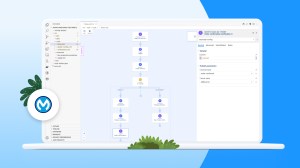MuleSoft today announced the open beta for AsyncAPI support in Anypoint Platform to facilitate the adoption of event-driven architectures (EDAs). This allows businesses to develop end-to-end integrations for event-driven applications, enabling systems to process and respond to real-time events efficiently. The new capabilities help organizations easily bring real-time customer interactions across various applications and systems by simplifying the complexity of connecting with popular event brokers and message queues.
EDAs can unlock new AI use cases by bringing real-time communication to systems or processes that contain fluctuating data sets, such as predictive maintenance, dynamic pricing, or fraud detection. For example, banks can use AI models to analyze transactional data and user behavior patterns to identify suspicious activities and trigger immediate responses such as transaction blocking or alerts to mitigate fraud risks.
Unlike other integration platforms with fewer capabilities, MuleSoft seamlessly brings a diverse set of integration capabilities into a single platform, empowering organizations to build APIs for a wide range of use cases, architectural patterns, or protocols — AsyncAPI, REST, and GraphQL APIs.
Why it matters: Sixty-four percent of consumers expect companies to respond and interact with them in real time, and businesses must build faster communication methods between applications to meet this demand. Creating event-aware applications is essential to achieving this goal, however, traditional approaches to event-driven integration can be complex and time-consuming. By incorporating end-to-end event-driven integration capabilities into their integration platform, MuleSoft is helping organizations rapidly adopt event-driven architectures and deliver real-time customer experiences.
What’s new: AsyncAPI support in Anypoint Platform allows businesses to take advantage of event-driven architectures and build end-to-end, event-driven integrations. The new capabilities enable organizations to support real-time customer experiences by extending their existing architectures to popular event brokers and message queues, such as Kafka and Anypoint MQ. With AsyncAPI support, developers and API architects can:
- Design and govern AsyncAPI specifications using MuleSoft’s API design tooling (Anypoint Design Center) or IDEs (Anypoint Code Builder and Anypoint Studio), which simplifies conformance with the AsyncAPI standard and predefined best practices.
- Discover and reuse events across the organization by publishing AsyncAPI specifications to MuleSoft’s public marketplace (Anypoint Exchange) for collaboration across the enterprise.
- Implement event-driven applications through a new, configuration-driven experience that simplifies the complexity of interacting with event brokers and message queues, such as Kafka and Anypoint MQ.
This innovation will open up new AI use cases to power customer experiences:
- Predictive Maintenance: Organizations can enable predictive maintenance across industrial applications by combining event-driven architectures with predictive AI models. For example, machines in the manufacturing process stream performance data to models that can predict when they will require maintenance, preventing failure and extended downtime to make repairs.
- Dynamic Pricing: Businesses can employ AI models with an event-driven system to analyze market trends, competitor pricing, and customer behavior in real time. For example, by streaming competitor pricing data and user behavior to models, systems can dynamically adjust the price of a product or introduce new promotions to stay competitive in the market.
- Real-time Recommendations: AI models can be integrated into an event-driven architecture to create real-time product recommendations. For example, a consumer shopping for camping gear will see related camping products based on their most recent search history and broader purchase history across all customers.
MuleSoft perspective: “In a fast-paced digital world, event-driven architectures are becoming ubiquitous by enabling real-time communication, resilient applications, and agile application networks. With AsyncAPI support, our customers can easily develop robust, interoperable event-driven applications while fostering collaboration and consistency. At MuleSoft, we embrace this standard to help developers rapidly design, catalog, and build event-driven Mule apps.” – Andrew Comstock, VP of Product Management
With AsyncAPI support, our customers can easily develop robust, interoperable event-driven applications while fostering collaboration and consistency. At MuleSoft, we embrace this standard to help developers rapidly design, catalog, and build event-driven Mule apps.
Andrew Comstock, VP of Product Management
Customer perspective: “With the addition of AsyncAPI support, adoption of EDA in Mulesoft has never been simpler. This enhancement allows us to easily integrate and manage real-time events across various systems and applications, streamlining our processes and boosting our operational efficiency.” – Manoj Venkatraman, Integration Lead, Clarks
Availability:
- Design, governance, and cataloging of AsyncAPI 2.6 specifications are generally available now.
- Implementation of AsyncAPIs in Anypoint Code Builder and Anypoint Studio is in open beta.
- Anypoint MQ is generally available.
Learn more:
- Read more news from MuleSoft Connect:AI
- Learn more about MuleSoft AI solutions
- Watch a video on AsyncAPI support on Anypoint Platform
- Dive deeper into AsyncAPI Support
- Learn more about MuleSoft
Any unreleased services or features referenced here are not currently available and may not be delivered on time or at all. Customers should make their purchase decisions based upon features that are currently available.


